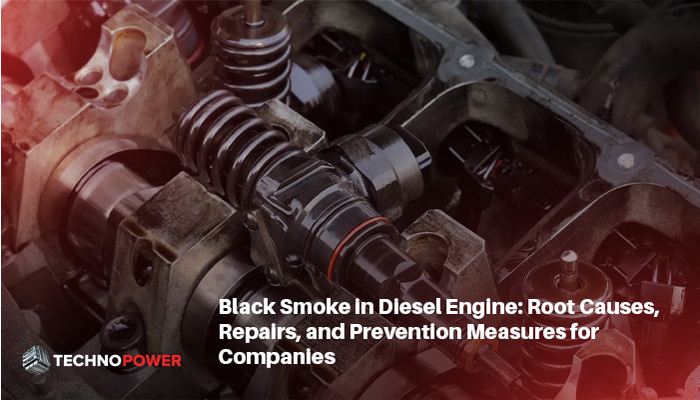Every minute of unplanned downtime for a diesel engine can mean direct losses in production or costly delays in services. One of the most common causes behind these interruptions is black smoke in diesel engines. It is not just an unpleasant sight—it is a clear warning that the engine is burning more fuel and operating with reduced efficiency. This can result in:
-
Higher operating costs
- Premature engine failure
- Regulatory fines and legal penalties
- Damage to the company’s reputation
In this complete guide, you will learn everything about black smoke in diesel engines: what it means, its main causes, repair methods, and most importantly, how to prevent it. For frequent generator-related issues, check our guide on Diesel Generator Troubleshooting or explore Best Industrial Generators to match your load requirements.
What Does Black Smoke in a Diesel Engine Indicate?
Diesel engines operate by compressing air and injecting fuel into the combustion chamber. Ideally, this process burns fuel efficiently, producing minimal emissions.
Black smoke = incomplete combustion. This means not all the diesel fuel is burning. The main causes include:
- Imbalance in the air-to-fuel ratio
- Faulty engine components
- Poor operating practices
Key takeaway: black smoke is essentially unburned fuel escaping through the exhaust.
Common Causes of Black Smoke in Diesel Engines
1. Excessive Fuel Injection
If more fuel is injected than the available air can burn, incomplete combustion occurs. Faulty injectors or improper tuning are common culprits.
2. Dirty or Clogged Air Filter
When airflow is restricted, the engine lacks oxygen. This is one of the simplest and most preventable causes of black smoke.
3. Turbocharger Failure
The turbocharger increases oxygen supply by forcing air into the cylinders. A failing turbo reduces airflow, leading to fuel-rich combustion and black exhaust.
4. Poor-Quality or Contaminated Fuel
Low-grade diesel or water-contaminated fuel disrupts combustion, producing soot and unburned fuel.
5. Faulty Fuel Injectors
Leaking or sticking injectors cause uneven fuel spray patterns, resulting in smoke and inefficient combustion.
6. Engine Overloading
Running the engine beyond its rated capacity demands more fuel than the available air can support. The result? Thick black smoke. If overloading is frequent, consider upgrading to Best Industrial Generators that can handle your business requirements efficiently.
7. Malfunctioning EGR System
A faulty EGR disrupts combustion temperatures and the air-fuel balance, leading to excessive soot buildup.
Business Risks of Ignoring Black Smoke
- Increased Operating Costs: wasted fuel means higher bills.
- Equipment Damage: poor combustion accelerates carbon buildup and damages engine parts.
- Downtime & Lost Productivity: smoking generators often break down, halting operations.
- Environmental & Legal Penalties: strict emissions laws in KSA & UAE may lead to fines.
- Reputation Damage: a smoking generator signals poor maintenance to clients.
How to Diagnose Black Smoke in Diesel Engines
- Visual observation of smoke density, color, and timing
- Air filter inspection
- Fuel system testing (injectors, pumps, regulators)
- Turbocharger & intercooler check
- Oil & fuel analysis
- Engine load monitoring
Fixing Black Smoke in Diesel Engines
- Replace or clean air filters
- Service or replace fuel injectors
- Repair or replace turbochargers
- Clean the fuel system
- Adjust engine load
- Perform regular maintenance & calibration
Preventing Black Smoke in Diesel Engines
- Scheduled maintenance for filters, injectors, turbos
- Use high-quality diesel from certified suppliers
- Proper engine tuning & calibration
- Load management to avoid overloading
- Operator training on correct practices
Case Study: Black Smoke in a Commercial Generator
Location: Riyadh, Saudi Arabia
Issue: 400 kVA Perkins generator emitting thick black smoke
Diagnosis: clogged air filters + faulty injector
Solution: replaced filters, repaired injectors, recalibrated system
Result: 18% reduction in fuel consumption + compliance with emission laws
FAQs About Black Smoke in Diesel Engines
Q1: Is black smoke always serious?
Not always, but persistent smoke usually signals air-fuel issues.
Q2: Can additives fix black smoke?
They help in minor cases but cannot replace repairs.
Q3: Does black smoke damage engines?
Yes, it increases wear and clogs filters.
Q4: Difference between black, blue, and white smoke?
Black = unburned fuel | Blue = oil | White = coolant/incomplete combustion
Q5: Can generators run with black smoke?
Yes, but at higher costs and reduced reliability.
TechnoPower Solutions for Diesel Smoke Problems
- Expert diagnostics for smoke issues
- On-site generator repair & calibration
- Preventive maintenance contracts
- Genuine Perkins spare parts
- 24/7 technical support across KSA & GCC
Don’t let black smoke disrupt your operations. Keep your engines efficient, compliant, and reliable with TechnoPower expert support.


